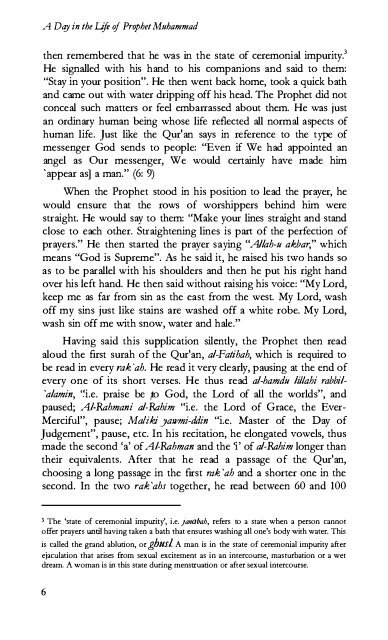A Day in The Life of Prophet Muhammad (pbuh) by Abd a-Wahhab b. Nasir al-Turayri
Many more Islamic media to read, listen, print and download at ww.IslamicGlobe.com and at www.QuranReciter.org
Many more Islamic media to read, listen, print and download at ww.IslamicGlobe.com and at www.QuranReciter.org
You also want an ePaper? Increase the reach of your titles
YUMPU automatically turns print PDFs into web optimized ePapers that Google loves.
A Dt'f)' <strong>in</strong> the <strong>Life</strong> <strong>of</strong> <strong>Prophet</strong> <strong>Muhammad</strong><br />
then remembered that he wa s <strong>in</strong> the state <strong>of</strong> ceremoni<strong>al</strong> impurity.3<br />
He sign<strong>al</strong>led with his hand to his companions and said to them:<br />
"Stay <strong>in</strong> your position". He then went back home, took a quick bath<br />
and came out with wa ter dripp<strong>in</strong>g <strong>of</strong>f his head. <strong>The</strong> <strong>Prophet</strong> did not<br />
conce<strong>al</strong> such matters or feel embarrassed about them. He wa s just<br />
an ord<strong>in</strong>ary human be<strong>in</strong>g whose life reflected <strong>al</strong>l norm<strong>al</strong> aspects <strong>of</strong><br />
human life. Just like the Qur'an says <strong>in</strong> reference to the type <strong>of</strong><br />
messenger God sends to people: "Even if We had appo<strong>in</strong>ted an<br />
angel as Our messenger, We would certa<strong>in</strong>ly have made him<br />
'appear as] a man." (6: 9)<br />
When the <strong>Prophet</strong> stood <strong>in</strong> his position to lead the prayer, he<br />
would ensure that the rows <strong>of</strong> worshippers beh<strong>in</strong>d him were<br />
straight. He would say to them: "Make your l<strong>in</strong>es straight and stand<br />
close to each other. Straighten<strong>in</strong>g l<strong>in</strong>es is part <strong>of</strong> the perfection <strong>of</strong><br />
prayers." He then started the prayer say<strong>in</strong>g "Allah-u akbar," which<br />
means "God is Supreme". As he said it, he ra ised his two hands so<br />
as to be par<strong>al</strong>lel with his shoulders and then he put his right hand<br />
over his left hand. He then said without rais<strong>in</strong>g his voice: "My Lord,<br />
keep me as far from s<strong>in</strong> as the ea st from the west. My Lord, wa sh<br />
<strong>of</strong>f my s<strong>in</strong>s just like sta<strong>in</strong>s are wa shed <strong>of</strong>f a white robe. My Lord,<br />
wa sh s<strong>in</strong> <strong>of</strong>f me with snow, water and h<strong>al</strong>e."<br />
Hav<strong>in</strong>g said this supplication silently, the <strong>Prophet</strong> then read<br />
<strong>al</strong>oud the first surah <strong>of</strong> the Qur'an, <strong>al</strong>-Fatihah, which is required to<br />
be read <strong>in</strong> every mk 'ah. He read it very clearly, paus<strong>in</strong>g at the end <strong>of</strong><br />
every one <strong>of</strong> its short verses. He thus read <strong>al</strong>-hamdu lillahi rabbil<br />
'<strong>al</strong>am<strong>in</strong>, "i.e. praise be God, the Lord <strong>of</strong> <strong>al</strong>l the worlds", and<br />
paused; Al-Rahmani <strong>al</strong>-Rahim "i.e. the Lord <strong>of</strong> Grace, the Ever<br />
Merciful", pause; M<strong>al</strong>iki yawmi-dd<strong>in</strong> "i.e. Ma ster <strong>of</strong> the <strong>Day</strong> <strong>of</strong><br />
Judgement", pause, etc. In his recitation, he elongated vowels, thus<br />
ma de the second 'a' <strong>of</strong> Al-Rahman and the 'i' <strong>of</strong> <strong>al</strong>-Rahim longer than<br />
their equiv<strong>al</strong>ents. After that he read a passage <strong>of</strong> the Qur'an,<br />
choos<strong>in</strong>g a long pa ssage <strong>in</strong> the first rak 'ah and a shorter one <strong>in</strong> the<br />
second. In the two rak 'ahs together, he read between 60 and 100<br />
> <strong>The</strong> 'state <strong>of</strong> ceremoni<strong>al</strong> impurity', i.e. janabah, refers to a state when a person cannot<br />
<strong>of</strong>fer prayers until hav<strong>in</strong>g taken a bath that ensures wash<strong>in</strong>g <strong>al</strong>l one's body with water. This<br />
is c<strong>al</strong>led the grand ablution, or ghus/ A man is <strong>in</strong> the state <strong>of</strong> ceremoni<strong>al</strong> impurity after<br />
ejaculation that arises from sexu<strong>al</strong> excitement as <strong>in</strong> an <strong>in</strong>tercourse, masturbation or a wet<br />
dream. A woman is <strong>in</strong> this state dur<strong>in</strong>g menstruation or after sexu<strong>al</strong> <strong>in</strong>tercourse.<br />
6














